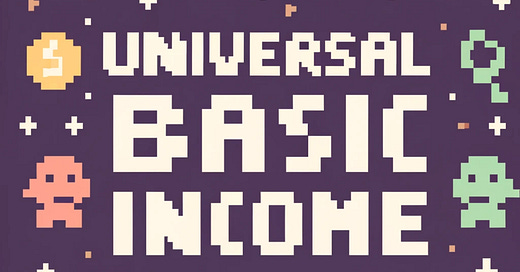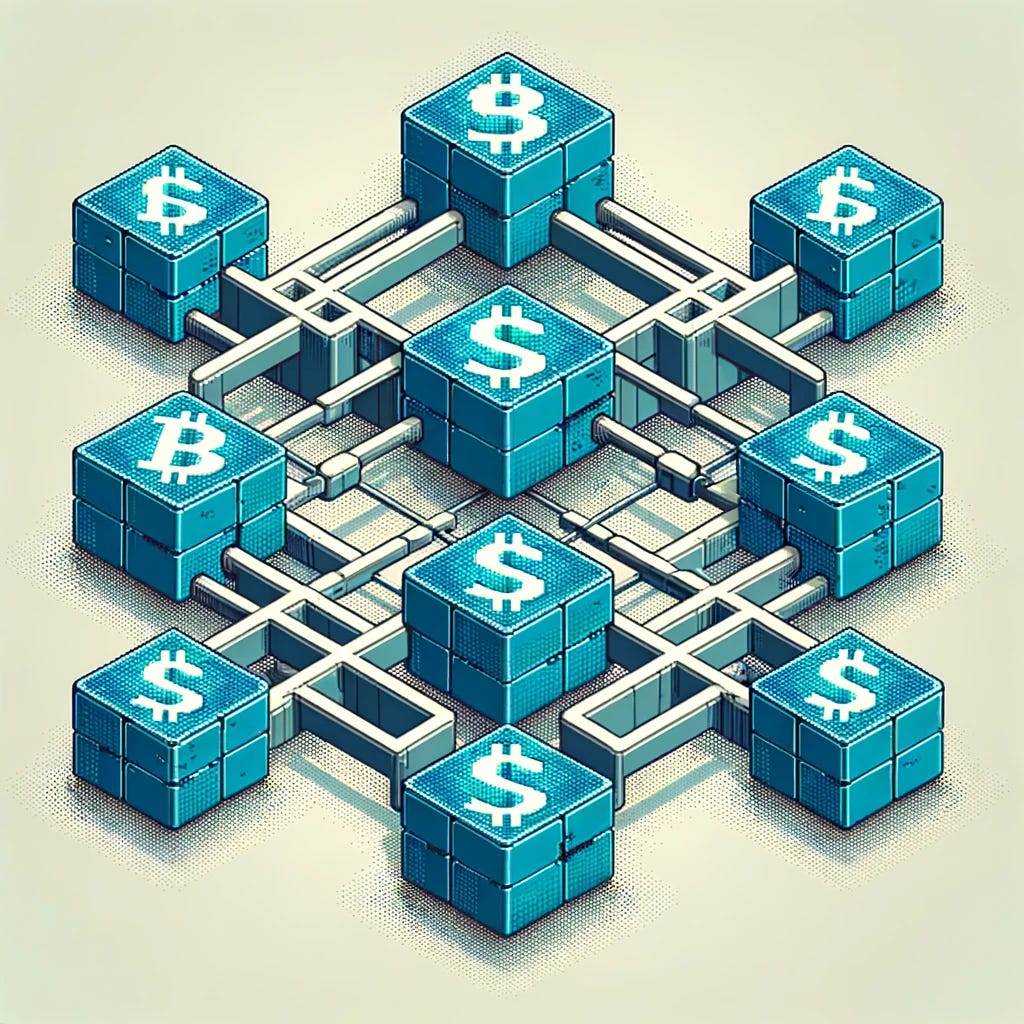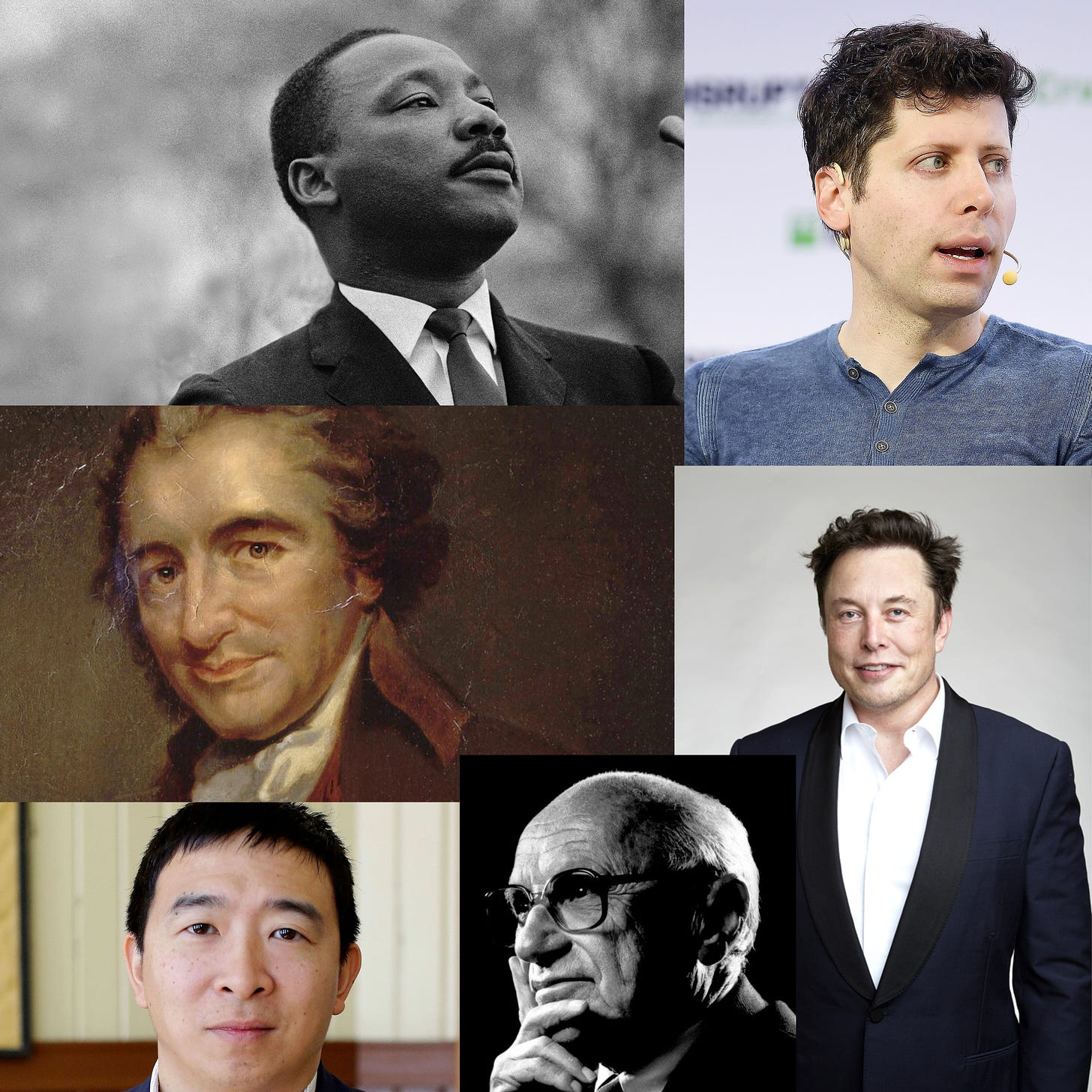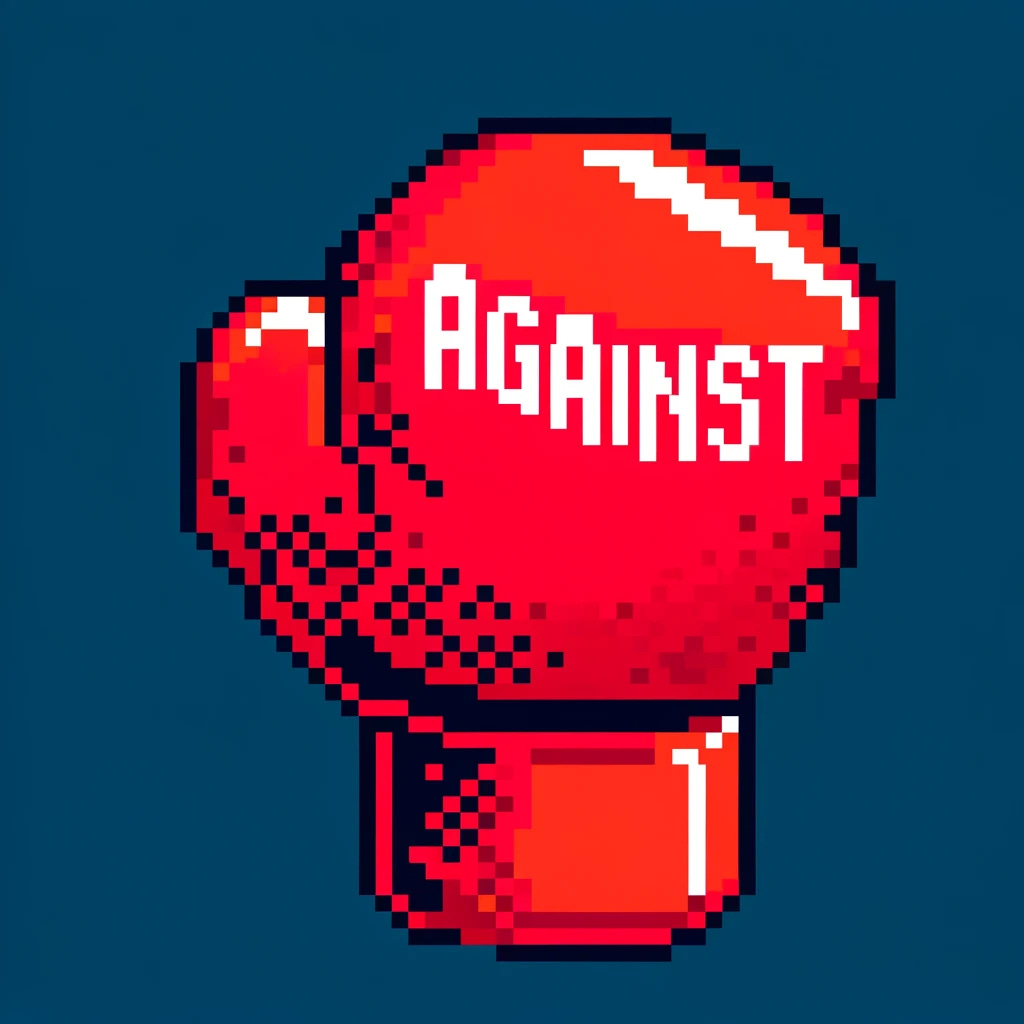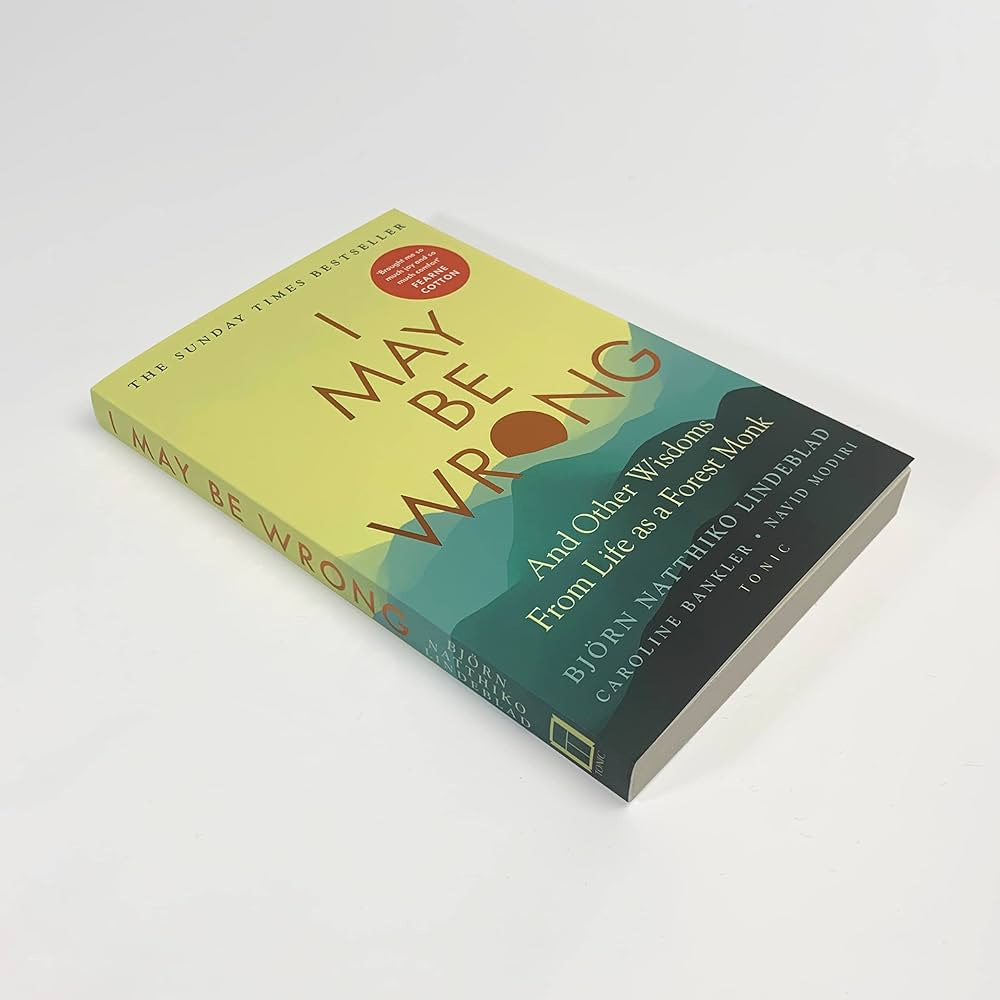Universal Basic Income in an AI World - FL#17
How can we financially protect those who lose jobs to AI?
Welcome to the 4 new crew members who have joined the frontier expedition since the last letter! If you haven’t subscribed, join the 79 curious explorers in our adventure to understand the frontier of innovative technologies as they relate to the human experience.
Today, we dive deep into UBI - I hope you enjoy :)
If you haven’t already, I’m posting YouTube videos to accompany the frontier letter. You can check out the videos here.
AI performing most modern jobs has become a stark possibility.
The following logic brought me to this conclusion: We are on the verge of creating an intelligence that exceeds human cognition and mechanical capability, operates 24/7, 365 days a year, and is cheaper, faster, better, and safer than humans. This will account for most of the roles in our current job market (see AI in The Workplace for the entire argument).
While the idea of losing our jobs anxiously raises eyebrows and invokes fear, I argue that uniquely human jobs will remain and amplify. I think this will be great for humanity given one critical detail—people's finances are worked out.
The financial aspect is fundamental to the AI job takeover conversation. If we can navigate it, we can easily ask, "What does it mean to be human, and how should I structure my life to live with meaning and purpose?"
However, these questions are inconceivable if families don't have the resources to see how they'll provide for tonight's dinner.
Imagine AI took 50% of the jobs in the current labor market - what would that mean for the finances of the unemployed?
State governments in the United States offer unemployment benefits. I live in Illinois, and the maximum payout with no dependents is $484 for 26 weeks (a longer time frame if there is a national emergency). If 40% of employed individuals lost their jobs and received maximum unemployment benefits, the fund would be short roughly $270 million after the first week1. The shortage prompts the need for the Federal Reserve's money printer. However, given the US poly-debt crisis and inflation, the Federal Reserve is unlikely to print money for anything, considering it may bring down the financial system.
We will need a universal basic income type system to distribute funds to the masses. It should not replace the competitive force of markets but rather serve as a base to raise the poverty floor and keep people afloat.
I have previously suggested a blockchain-based system to collect and distribute AI-generated revenue, reducing the potential for corruption and needless overhead.
I fear the giantism of both governments and massive corporations, especially given they are already behemoths. Controlling that much money is a lot of responsibility. In the hands of the weak, it can run poorly and become a mechanism for evil.
Today, I will deepen my thoughts on a UBI system's architecture by doing the necessary background work - I will dive into what UBI is, consider the arguments for and against it, look at case studies that have been performed, and consider what a UBI system may do for people.
Before I start exploring UBI, I want to make an important note that, if not clarified up front, might influence your interpretation of my intention: I do not favor communism by any stretch of the imagination.
First and foremost, I am for free markets and individual liberty.
Humanity can find a path to an incorruptible UBI-type system that is a synthesis of free market competition, not a replacement.
But it will only happen with conversation. If I'm wrong, let my thoughts die in the face of discussion, not the darkness of suppression.
Large undertaking, but it's necessary to at least start - let's get to it.
What is UBI
UBI stands for Universal Basic Income, traditionally defined as a government program that gives regular cash payments to every community member without work requirements or other conditions.
Given the new possibilities, we need to expand our minds and change the definition slightly.
Unless otherwise stated, I will use the following definition going forward:
UBI is a program that gives regular currency and asset payments to every community member without work requirements or other conditions.
UBI-like proposals are not new. In America, this idea can be traced back to 175, with one of the founding fathers, Thomas Pain. He proposed a payment of 15£ for people after turning 21 and an annual 10£ after turning 50.
Individuals such as Martin Luther King, Milton Fridman, 2020 presidential candidate Andrew Yang, Elon Musk, and Sam Altman have all expressed interest and support for a UBI system.
The image below depicts the basic requirements for a program to be considered UBI:
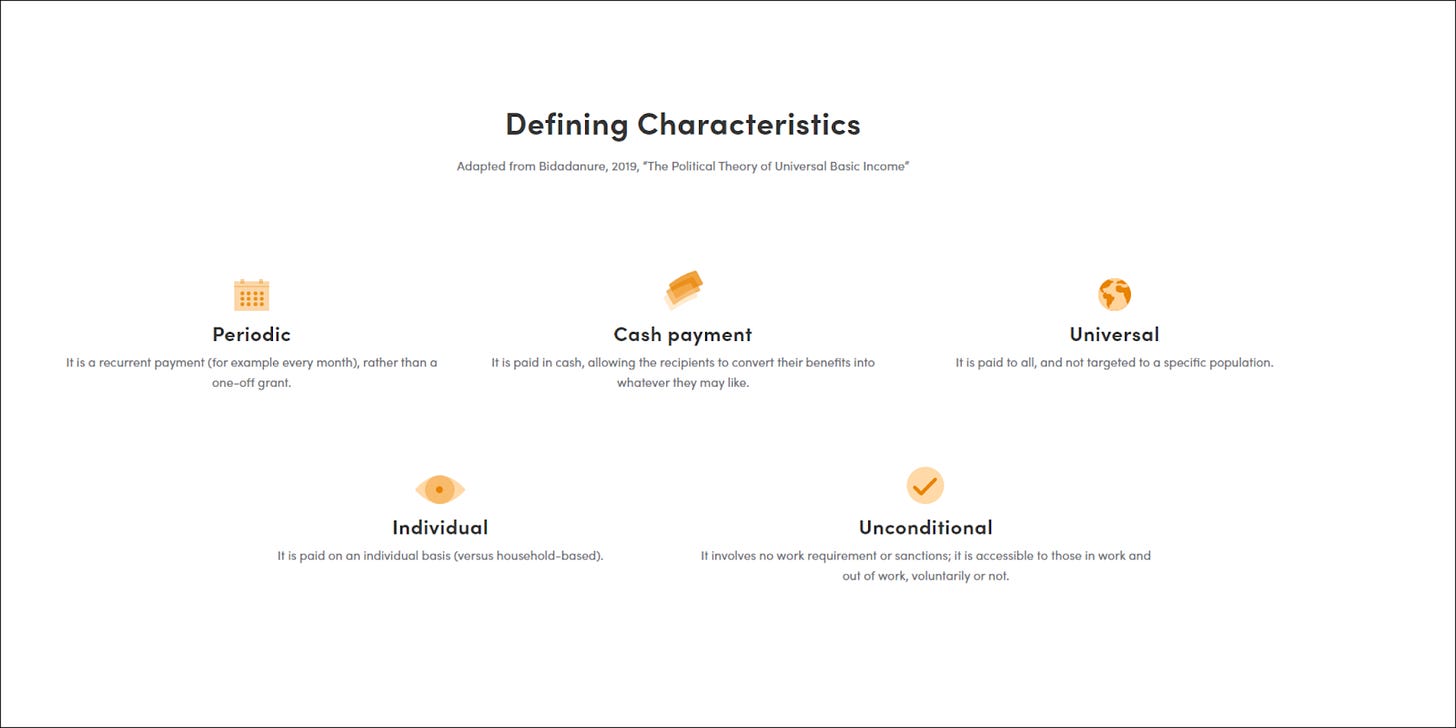
In my proposal, UBI SHOULD NOT remove market competition; a free market is required for a functioning and thriving economy. It is the best way to actively calculate the correct price of goods and services. 'Jobs' will remain even with AI, but they will look very different and contain far more meaningful jobs.
Additionally, UBI must redistribute money/assets, not create more.
If the UBI system removes free markets and creates money rather than redistributes it, I would be highly skeptical and likely against the implementation.
Hypothetically, UBI sounds phenomenal! I bet you'd have a hard time finding people who would be against receiving a monthly payment to support themselves and their families.
However, before we propose a nation-state-scale UBI system, we must consider all arguments and examine examples to understand what can maximize benefits and reduce drawbacks.
Theory and case studies will undoubtedly increase our understanding, so let's look at what information they offer.
Arguments and Case Studies
Arguments Against UBI
Arguments Against UBI
The classic arguments against universal basic income are as follows:
Disincentivize Work: UBI might reduce the motivation to work.
No Employment Increase: The 2017 Finish experiment (see case studies) showed no substantial increase in employment.
Creates Inflation: High consumer demand driven by UBI can increase prices because there is more money to compete for the same products.
Management Challenges: Managing on a large scale would be difficult.
High Cost: Notably, a research paper written at Berkley in 2018 concluded that if UBI were distributed as $12,000 per year to every adult over 18 years of age, it would cost approximately $3 trillion, which was roughly 75% of current federal spending at the time
Moral Hazard: It could create a population dependent on a government 'hand-out.'
Responses to the Arguments:
Most of the arguments against UBI fall flat if executed because it involves an AI job displacement scenario, and the system's mechanism is blockchain.
Disincentivize Work and No Employment Increase: These arguments become negligible if UBI is presented because of AI job displacement given that traditional jobs will be inhabited by AI, so the incentive to work doesn't matter; the incentive to find meaningful pursuits in life will be important, though, and I think UBI can help open this door.
Creates Inflation and Management Challenges: These arguments fall apart if done via a blockchain, as management will be streamlined, and revenue and asset redistribution, not monetary creation, will negate the likelihood of inflation.
High Cost: This is a strong argument against UBI. Though, the devil is in the details. In the case of the implementation, a combination of AI-generated revenue, company shares, and government shares could be distributed via a blockchain. This will certainly get us to the necessary funding without requiring it to come solely from the government and tax revenue. More details on the financing will be provided in later Frontier letters.
Moral Hazard: This is related to one of my primary concerns with UBI because it exists regardless of whether blockchain or AI is used - mass complacency.
There is no better example of mass complacency than a little-known but massive company called Buy n Large, which owns the Axiom. The Axiom houses Earth's ancestral inhabitants, who have become complacent because there is no necessity to drive them; why do anything? Their entire lives are catered to by AI and futuristic technologies.
That is until one day, the Waste Allocation Load Lifter: Earth-Class (WALL-E) finds a plant on Earth that was thought to be barren and goes on a journey with the Extraterrestrial Vegetation Evaluator (EVE) to show humans that there is hope for Earth.
If not clear by now, I'm referring to the fictional Pixar movie, WALL-E. While not a film about UBI, it highlights something fundamental about the human experience. Giving into a life of care-free, full-throttle hedonism is a possible trajectory of the human experience. The antidote to this is partly to find and accept responsibility for something worth struggling for.
With UBI, that forte can be more meaningful and passion-filled, but we must work to individually transcend ourselves to move the culture to a place where we don't fall into a hedonistic state of complacency.
While this is a consideration, UBI or not, humanity will always have complacency seekers. I'm sure you've seen this in your life or in other stories and myths. They're described as Pixies in my favorite fictional series, Red Rising.
I think we can avoid mass complacency so long as the UBI slogan does not sound like this:
Okay, so why is UBI a good idea?
Arguments For UBI
Arguments For UBI
The classic arguments for universal basic income are as follows:
Help Job Displacement: Can mitigate the impact of automation taking over jobs.
Supports Low-Income Individuals: Can lift the poverty floor.
Streamline Welfare: Simplifies welfare, removes bureaucratic overhead, and makes distribution more efficient.
Supports Non-Traditional Work: Helps support non-traditional forms of work, such as caregiving and community service, often undervalued and unpaid.
Encourage Entrepreneurship: With a financial safety net, individuals can take risks and explore entrepreneurial ventures without fearing deprivation.
Increases General Well-Being: Numerous studies, including the "failed" Finnish experiment, show that UBI recipients report higher levels of well-being.
Responses to These Arguments
Help Job Displacement and Support Low-Income Individuals: I don't think any great counterarguments here. It's self-evident that people who lose their income will benefit from having money to supplement it. If poor people are provided with money, they can use that money to pay bills and attempt to climb from 0 to at least 1.
Streamline Welfare: The argument against this is something like the one-size-fits-all support could result in the loss of targeted support to those who need it, like those with disabilities. I think that's generally true, and to effectively "remove" all other welfare programs, I believe the UBI needs to provide an amount of money supplementing the other programs. If the means of production are automated to the extent that everything costs as close to $0 as possible, then there isn't an issue here.
Supports Non-Traditional Work and Encourages Entrepreneurship: People who disagree with these notions would likely argue that it would discourage the traditional employment structure and risk complacency. Some would say the complacency would stifle innovation as the entrepreneurial spirit would flee in light of the newly minted monthly fortune. Firstly, the traditional employment structure in this case we are discussing would not exist, but I agree with the complacency rebuttal. As discussed in this newsletter, a non-traditional work structure will be needed.
Increases General Well-Being: Some argue it has the opposite effect, but again, I don't know that money is necessarily what causes this. The individual's mindset will be the driver of this, but does that mean we shouldn't implement UBI? Money can be life-changing in increasing general well-being.
One of the strongest arguments for UBI is that the well-being of the community will increase, which can actually be demonstrated by our "failed" Finish experiment once again, where they found that while there was no significant increase in employment, there was an increase in general well-being.
I was recently in between books to read, and it felt as if this memoir on my bookshelf was calling out to me; I May Be Wrong was the title of Bjorn Natthiko's memoir. He was due to get promoted to the CFO of the company he worked for. He took us through his emotional journey at the beginning of this experience as anxiety-invoking and gut-wrenching. He didn't want this life, and it wasn't him - so he quit and became a Thai forest monk. There was SO much wisdom in this book; here are just some pieces of wisdom I noted as they had a significant impact on me:
You are not your every thought.
"The meaning in life is to find your gift and give it away."
Trust the world a little more.
There's so much more, and I'm sure you're thinking, " Wow, this is great and all, but what does this have to do with UBI?"
While writing this, I remembered Bjorn making a small yet important note about transitioning to his nomadic life after work, "…Then I paid off my student loans: you're not allowed to be in debt if you want to be a forest monk."
People underestimate the power that money has in transforming someone's life.
For every person for whom the money ends up making a complacent pigsty, it also makes it possible to transcend a soul to become as beautiful as Bjorns.
Case Studies
UBI has been and is being tried in many different places and at various scales, all with variable results.
The first example takes us to the largest state in the US, where once the sun sets in late November, some residents don't see it rise again for over 60 days. Since 1982, Alaska has been distributing annual cash payments to each of its residents, ranging anywhere from $1,000 - $2,000 in recent years. The payments come from the Alaska Permanent Fund, an investment fund financed by Alaska oil revenues. The University of Alaska Anchorage wrote a research paper that concluded that depending on the year, the dividend lifts 15,000-25,000 people from poverty.
It was quite interesting to read about the Alaska annual dividend because I had no idea that a universal basic income was being distributed on a state level for as long as it has been. It's a good example that a massive revenue stream can be allocated to a wide range of people to their benefit. In 2019, Stockton, California, was also distributing UBI to 125 people living in neighborhoods at or below Stockton's median household income, which resulted in an overall increase in the well-being of the individuals involved.
Not every experiment has had great outcomes, such as the 2016 experiment in Ontario, Canada, and the Finish experiment in 2017, which did not increase employment in the unemployed folks who received the distribution - which was the intention of those programs.
One consistency I have noticed in a 'failed' UBI experiment is the lack of its ability to incentivize an increased level of employment. The point of this entire discussion is not a debate about whether UBI serves as a better program for getting people back on their feet than the current welfare system, nor are we discussing UBI as a way to incentivize individuals to participate in the workforce.
This conversation is about making sure that in a potential era where working is optional and being jobless becomes a norm, there needs to be a backdrop for people so they can still reasonably maintain their standard of living and still explore what life has to offer.
Attempting to think through how a system at this scale would work is difficult; the experiments have not been done on a very large scale, and trying to ideate what it would look like to provide benefits to hundreds of millions of people is difficult, but there is definitely a way this can be made possible, I'll attempt to answer this Million (more accurately, trillion 😉) dollar question in future pieces: How much money will people get, and where does it come from?
Sub to stay tuned :)
Conclusion
Universal Basic Income will become a defining debate over the next few decades, especially as AI becomes more intelligent and able to perform human tasks more effectively and efficiently.
Time will tell whether AI creates or takes more jobs. Regardless, we need to consider that there will likely be short-term pain in both cases and even if it is temporary, UBI will help people land on their feet at a minimum.
This is not the last time I will think about UBI—next time, I will attempt to ideate the required architecture of the UBI system to understand the full extent of its utility.
There are still many areas to explore here. The conversation about UBI is still a foggy map that will require much more than a couple of letters to understand comprehensively. It may even take a couple of experiments to grasp it fully.
While there are risks of mass complacency and figuring out the architecture and funding will be difficult, this is a necessary discussion.
Some questions I would love to hear your thoughts on:
What do you think about Universal Basic income?
What do you think are its biggest benefits and drawbacks?
Have you seen money change people’s lives in the way that Bjorn was able to live his best life, become a wonderful human, and help others with his words, or did you see it make people complacent and lose themselves like the inhabitants of the Axiom?
Math Check:
Population * Current Employment Rate * 40% * Max Unemployment Payout = Required Unemployment Payout
12,812,508 * 0.617 * 0.40 * 464 = $1,467,226,916.1216
Total March 29, 2024 Unemployment Fund = $115,600,730.25
Total March 29, 2024 Unemployment Insurance Trust = $1,082,217,583.45
115,600,730.25 + 1,082,217,583.45 = $1,197,818,313.7 = Available for Funding Unemployment as of March 29, 2024
Available for Funding Unemployment as of March 29, 2024 - Required Unemployment Payout = Net Unemployment Funding
$1,197,818,313.7 - $1,467,226,916.1216 = -$269,408,602.4216


